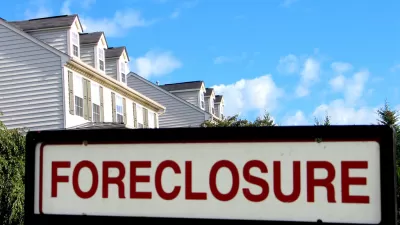Contracts for deed are gaining popularity at investment firms that scooped up swaths of foreclosed properties during the Great Recession. The risk for buyers, however, smacks of the same misdeeds that created that historic crisis in the first place.

The editorial Board of The New York Times raises alarms about the growing prominence of contracts for deed—a Depression-era financial arrangement with roots in racist housing policy.
The editorial follows a recent report in The Times by Alexandra Stevenson and Matthew Goldstein, finding contracts for deed "increasingly being used by investment firms that have bought thousands of foreclosed homes and want to sell them to lower-income buyers 'as is,'" according to the editorial.
Contracts for deed make gouging possible, because unlike traditional mortgages, there is no appraisal or inspection to ensure that the loan amount is reasonable. They also let an investor swiftly evict buyers for missed payments, rather than giving them time to catch up, as required under a mortgage. And they usually require the buyer to pay hefty upfront fees. Unlike a rental security deposit, however, the fee is almost never refundable.
The editorial compares contracts for deed to the subprime loans of the housing bubble leading up to the Great Recession. After making it clear that contracts for deed only help investors, while "nearly always" inflicting harm for borrowers, the editorial calls for the Consumer Financial Protection Bureau to "assert its authority over these contracts…"
FULL STORY: The Racist Roots of a Way to Sell Homes

Planetizen Federal Action Tracker
A weekly monitor of how Trump’s orders and actions are impacting planners and planning in America.

Maui's Vacation Rental Debate Turns Ugly
Verbal attacks, misinformation campaigns and fistfights plague a high-stakes debate to convert thousands of vacation rentals into long-term housing.

San Francisco Suspends Traffic Calming Amidst Record Deaths
Citing “a challenging fiscal landscape,” the city will cease the program on the heels of 42 traffic deaths, including 24 pedestrians.

Defunct Pittsburgh Power Plant to Become Residential Tower
A decommissioned steam heat plant will be redeveloped into almost 100 affordable housing units.

Trump Prompts Restructuring of Transportation Research Board in “Unprecedented Overreach”
The TRB has eliminated more than half of its committees including those focused on climate, equity, and cities.

Amtrak Rolls Out New Orleans to Alabama “Mardi Gras” Train
The new service will operate morning and evening departures between Mobile and New Orleans.
Urban Design for Planners 1: Software Tools
This six-course series explores essential urban design concepts using open source software and equips planners with the tools they need to participate fully in the urban design process.
Planning for Universal Design
Learn the tools for implementing Universal Design in planning regulations.
Heyer Gruel & Associates PA
JM Goldson LLC
Custer County Colorado
City of Camden Redevelopment Agency
City of Astoria
Transportation Research & Education Center (TREC) at Portland State University
Jefferson Parish Government
Camden Redevelopment Agency
City of Claremont





























